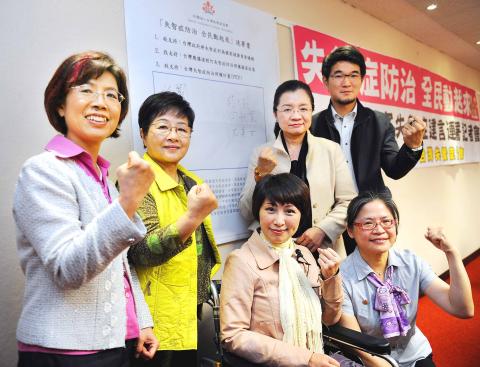The nation still lacks a proper national plan for the prevention and treatment of Alzheimer’s disease, the Taiwan Alzheimer’s Disease Association (TADA) said yesterday.
The association said the number of people in the nation with the disease has risen to about 200,000 this year and could reach 720,000 by 2056.
In advance of the 28th International Conference on Alzheimer’s Disease, which is scheduled to be held in Taipei from April 18 through April 20, the association launched a petition urging the government to list the disease as a national health issue and to take its “Taiwan Dementia Plan” — a national strategy proposal addressing Alzheimer’s disease and its effects researched and recommended by TADA — seriously.

Photo: Fang Pin-chao, Taipei Times
Association secretary-general Tang Li-yu (湯麗玉) said that as the country rapidly ages and the number of people with Alzheimer’s grows, it is estimated that there could be four Taiwanese in every hundred suffering dementia by 2056.
“The South Korean government recently started to address this problem, but we still don’t see any concrete progress from our own government,” Tang said.
TADA’s Taiwan Dementia Plan sets out some major goals concerning the four dimensions of prevention, treatment, care and protection, emphasizing the importance of a coordinated approach and an overhaul of current policy.
Five lawmakers from the two major parties were also present to sign the petition, and commented on the dire situation sufferers of the disease and the nation as a whole are facing.
Democratic Progressive Party (DPP) Legislator Chen Chieh-ju (陳節如) said daycare centers for the elderly are not specialized enough to separate those with dementia from those with other problems, and the necessary funding from the central government for the establishment of specialized care centers is lacking.
More government campaigns to raise public awareness of the disease, its effects and possible treatments or methods of prevention are needed, DPP Legislator Yu Mei-nu (尤美女) and Chinese Nationalist Party (KMT) Legislator Yang Yu-hsin (楊玉欣) said.
Fu Chung-ling (傅中玲), a neurologist at Taipei Veterans General Hospital, said that possibly due to a lack of awareness, only about 30,000 people, out of the estimated 200,000 suffering dementia, have the government-issued handbook for people with disabilities.
DPP legislators Liu Chien-kuo (劉建國) and Tien Chiu-chin (田秋堇) said the government has been merely focusing, with little success, on the aspect of care for people with the disease, while what it should be doing is expanding its coverage to incorporate all four dimensions of the disease and set up a cross-ministry group to address the issue and address the impending Alzheimer’s crisis.

Alain Robert, known as the "French Spider-Man," praised Alex Honnold as exceptionally well-prepared after the US climber completed a free solo ascent of Taipei 101 yesterday. Robert said Honnold's ascent of the 508m-tall skyscraper in just more than one-and-a-half hours without using safety ropes or equipment was a remarkable achievement. "This is my life," he said in an interview conducted in French, adding that he liked the feeling of being "on the edge of danger." The 63-year-old Frenchman climbed Taipei 101 using ropes in December 2004, taking about four hours to reach the top. On a one-to-10 scale of difficulty, Robert said Taipei 101

Taiwanese and US defense groups are collaborating to introduce deployable, semi-autonomous manufacturing systems for drones and components in a boost to the nation’s supply chain resilience. Taiwan’s G-Tech Optroelectronics Corp subsidiary GTOC and the US’ Aerkomm Inc on Friday announced an agreement with fellow US-based Firestorm Lab to adopt the latter’s xCell, a technology featuring 3D printers fitted in 6.1m container units. The systems enable aerial platforms and parts to be produced in high volumes from dispersed nodes capable of rapid redeployment, to minimize the risk of enemy strikes and to meet field requirements, they said. Firestorm chief technology officer Ian Muceus said

MORE FALL: An investigation into one of Xi’s key cronies, part of a broader ‘anti-corruption’ drive, indicates that he might have a deep distrust in the military, an expert said China’s latest military purge underscores systemic risks in its shift from collective leadership to sole rule under Chinese President Xi Jinping (習近平), and could disrupt its chain of command and military capabilities, a national security official said yesterday. If decisionmaking within the Chinese Communist Party has become “irrational” under one-man rule, the Taiwan Strait and the regional situation must be approached with extreme caution, given unforeseen risks, they added. The anonymous official made the remarks as China’s Central Military Commission Vice Chairman Zhang Youxia (張又俠) and Joint Staff Department Chief of Staff Liu Zhenli (劉振立) were reportedly being investigated for suspected “serious

American climber Alex Honnold is to attempt a free climb of Taipei 101 today at 9am, with traffic closures around the skyscraper. To accommodate the climb attempt and filming, the Taipei Department of Transportation said traffic controls would be enforced around the Taipei 101 area. If weather conditions delay the climb, the restrictions would be pushed back to tomorrow. Traffic controls would be in place today from 7am to 11am around the Taipei 101 area, the department said. Songzhi Road would be fully closed in both directions between Songlian Road and Xinyi Road Sec 5, it said, adding that bidirectional traffic controls would